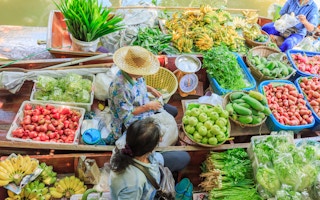To ensure food security and nutrition in Southeast Asia amid a shrinking agricultural workforce, growing population and diminishing natural resources, businesses, governments and civil society need to work together along the entire food chain to identify problems and find solutions to address them.
To continue reading, subscribe to Eco‑Business.
There's something for everyone. We offer a range of subscription plans.
- Access our stories and receive our Insights Weekly newsletter with the free EB Member plan.
- Unlock unlimited access to our content and archive with EB Circle.
- Publish your content with EB Premium.
This was the findings of a new report by non-profit group Forum for the Future and dairy giant FrieslandCampina released on June 26.
The report, titled “Addressing food and nutrition security through partnerships and strong business leadership”, was drawn from a roundtable held in Singapore in May with 21 representatives from agrifood multinationals, crop producers, food retailers, financial institutions, logistics and packaging firms, academia, nutrition companies, and international and non-governmental organisations.
The roundtable explored areas in which companies across the food supply chain could collaborate, and where solutions scaled up across Southeast Asia, the Forum and FrieslandCampina said in a statement.
Companies represented included commodity trader Cargill, NGOs Nutrition for Every Child and Grow Asia, agribusiness Monsanto and FrieslandCampina, as well as logistics firms Deutsche Post DHL and Toll Global Logistics.
Food security is crucial for the region because more than 60 million people will join the middle class over the next five years, according to research consultancy Accenture. Globally, total food calories will have to increase 50 percent by 2030 from 2010 if the global population is to be fed properly, the US non-profit Population Institute estimates.
The United Nations has also defined food security as “when all people at all times have access to sufficient, safe, nutritious food to maintain a healthy and active life”.
The participants of the roundtable identified four key areas where businesses can and are already acting on food and nutrition security which can be scaled up. These are: agricultural sustainability, supply chain infrastructure, product innovation for nutrition and promoting healthier eating and lifestyle choices.
“
This report truly affirms and underscores the ability of partnerships to address complex sustainability challenges. And we believe that together we can reimagine the value created across food networks and restore resilience within the system.
Ariel Muller, director, Asia Pacific, Forum for the Future.
These initiatives include improving the livelihood of farmers using more sustainable production, improving land management and conserving biodiversity, as well as cutting down waste, inefficiency and bottlenecks in the entire food supply chain in the region.
The group also said that all parties need to work on developing healthier food products and improving access to fresher produce, which would in turn lead to better consumer choices and perhaps, a reduction in food waste.
“Food and nutrition security is a complex issue; no one entity can solve this global problem on its own,” Piet Hilarides, chief operating officer, FrieslandCampina Asia said. “The roundtable highlighted that a collective effort among different players is necessary in order to bring about change.”
“We intend to share this report widely and invite any business involved in the food value chain in Southeast Asia to use this material to explore food and nutrition security, and find a way to contribute to it in a way that builds, rather than duplicates, what is already happening.”
The group also offered three recommendations: first, for businesses and partners working on smallholder agricultural sustainability to coordinate their efforts; second, for companies in logistics, packaging and information and communications technologies (ICT) to work with those in the food supply chain to optimise efficiency and reduce waste; third, for firms, government bodies and NGOs to create a shared approach to engaging the consumer on better diet and lifestyle choices.
The group suggested a smallholder farming lab that would work to coordinate efforts in sustainable agriculture in key commodities. Parties would share resources, knowledge and brainstorm on solutions to problems.
They also suggested a coalition of logistics and packing firms that would drive efficiences in the supply chain infrastructure, starting from post-harvest storage to delivery to supermarkets and consumers.
Finally, to educate consumers on making better food choices, government bodies, companies and NGOs would use a concerted campaign, with a common message, on a national and regional basis.
“This report truly affirms and underscores the ability of partnerships to address complex sustainability challenges,“ said Ariel Muller, director, Asia Pacific, Forum for the Future. “And we believe that together we can reimagine the value created across food networks and restore resilience within the system.”










